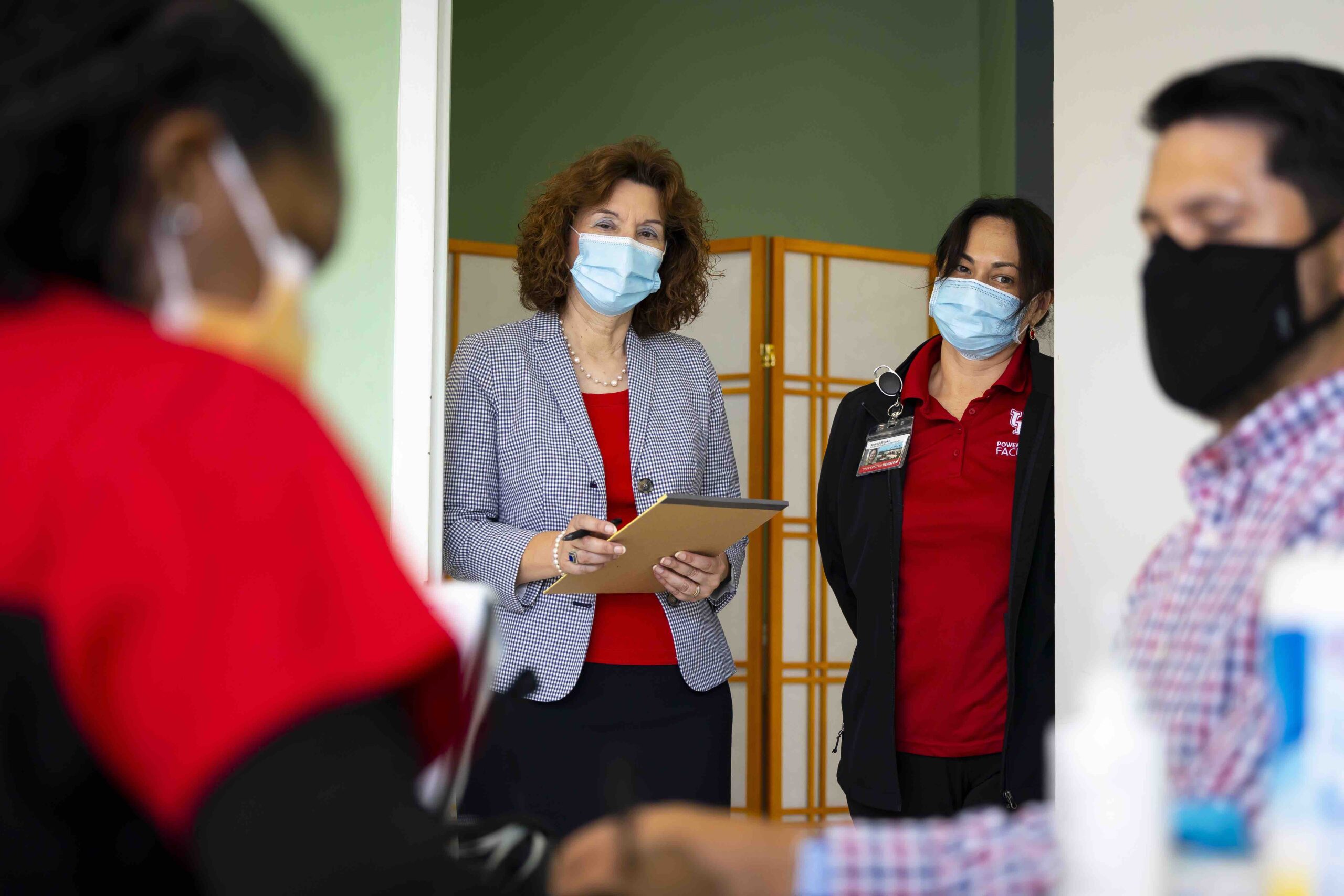 University of Houston faculty Dr. Teresa McIntyre and Dr. Andrea Brooks observe a practice run at a new clinic featuring both nurse-run care and telehealth services on Monday, Aug. 30, 2021. The clinic is located in one of St. Paul’s United Methodist downtown buildings on Fannin Street and is a partnership between the church and the University of Houston.
University of Houston faculty Dr. Teresa McIntyre and Dr. Andrea Brooks observe a practice run at a new clinic featuring both nurse-run care and telehealth services on Monday, Aug. 30, 2021. The clinic is located in one of St. Paul’s United Methodist downtown buildings on Fannin Street and is a partnership between the church and the University of Houston.
By Lindsay Peyton
Photos by Annie Mulligan
Building trust was the first order of business when the University of Houston College of Nursing Health Clinic opened at St. Paul’s UMC, Houston in the fall of 2021. The clinic offers free basic medical care to the city’s homeless and working poor. Staffing is provided by the college’s nursing students and their professors.
“At first, it was just a waiting game to see if anyone would come,” Rev. Andrew Wolfe, chair of the clinic’s advisory board, said.
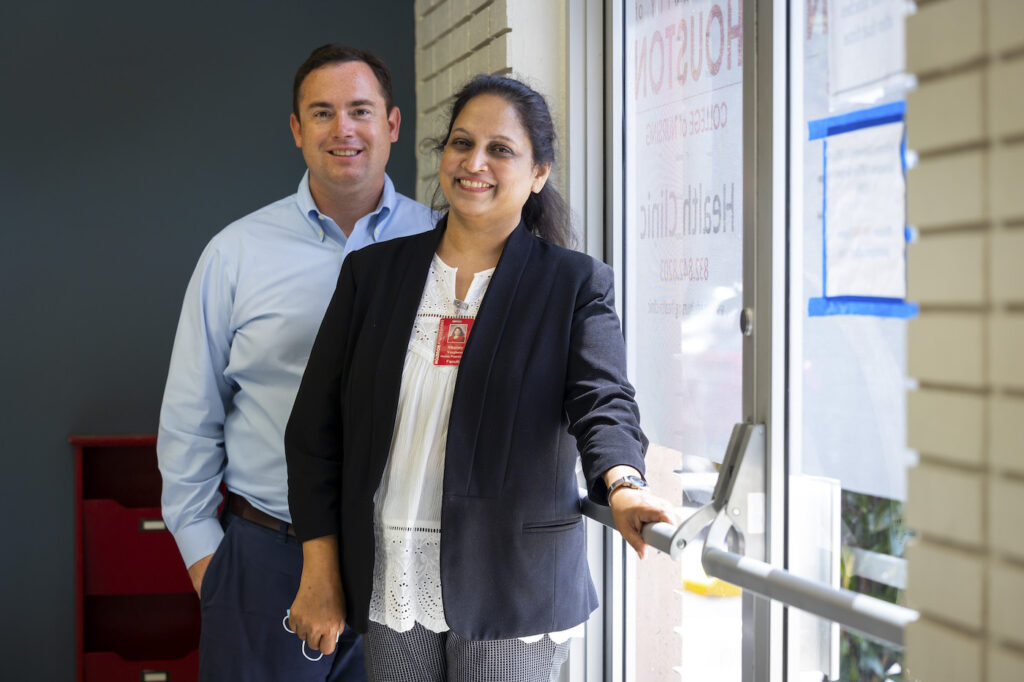
He explained that the new healthcare facility needed to gain the confidence of the individuals it aimed to serve. At the same time, the staff of the clinic was gaining an understanding of the unhoused and uninsured community.
Hosting a blood pressure screening event ended up moving the needle, according to Dr. Shainy Varghese, director of the Health Clinic.
The facility shares a space on St. Paul’s campus with the Emergency Aid Coalition (EAC), an interfaith nonprofit that provides food, clothing and assistance to those in need. The organization feeds about 250 individuals each day.
The UH College of Nursing Health Clinic decided to erect a tent and offer free blood pressure screenings to the EAC clients. “Several people had high blood pressure and were not on meds,” Varghese said. “Some didn’t know where to go.”
She sent them inside the clinic, where healthy snacks were also waiting. “It was making us visible – and building trust,” she said.
In the meantime, flyers went out and sandwich boards were raised directing patients to the clinic. Soon, word of mouth spread. “After about six months, it just exploded,” Wolfe said.
Once wary, patients were now becoming regulars and asking if the clinic could be their home for primary care. “It’s a totally different experience, a different approach to medicine, a different model,” Wolfe said.
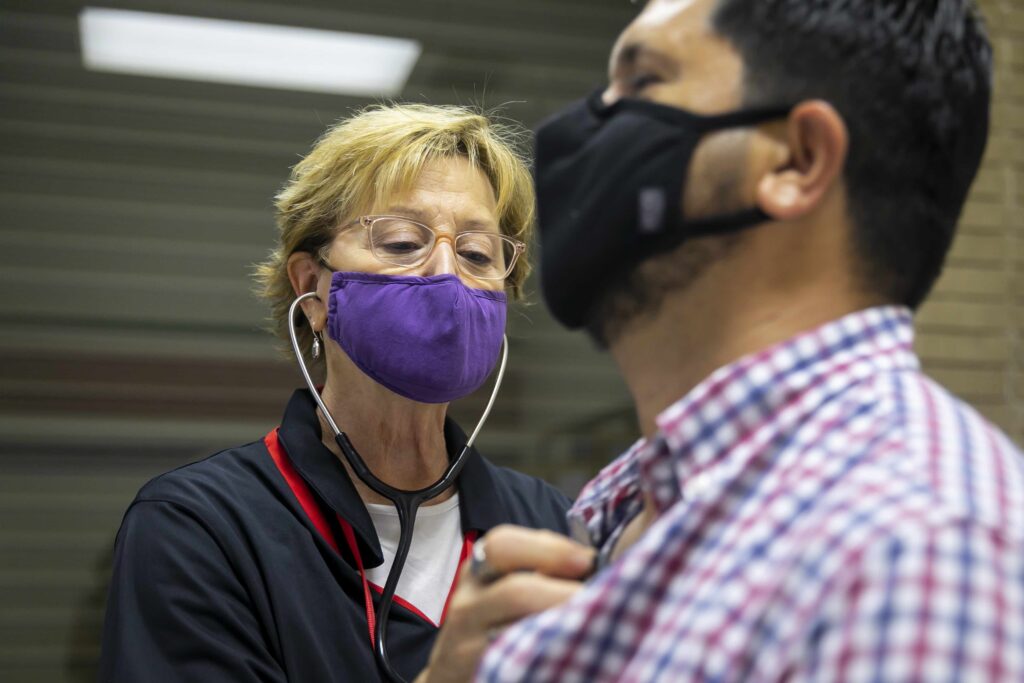
In its first year and a half of operation, the clinic has expanded its hours – from operating one day a week to two. Now, the facility is open from 8:30 a.m. to 2 p.m. on Mondays and Thursdays.
Varghese said about seven patients are served each day – and the goal is 10. Patients are seen for wellness exams, management of acute and chronic conditions and treatment of minor injuries, colds and flu. The clinic is connected to a pharmacy.
Over time, the services offered at the clinic have also grown. Partnerships have been fostered, as well. For instance, UTHealth Houston’s Mobile Dental Van rolled into the parking lot on April 14.
Last semester, UH nursing students joined the clinic staff. Their professors ran the facility until it was ready to become a training site.
Now, the goal is to add mental health care to the clinic – and to eventually expand to three days a week.
“We have definitely seen the demand,” Wolfe said. “We know the need is there – and we want more people to know about us.”
Rev. Brandi Horton, Executive Pastor at St. Paul’s UMC, heads to the clinic to pray with staff when it opens. “I ask them what prayer they need for that day,” she said.
Horton wants to equip more pastors at the church to work with the clinic in whatever capacity needed. She also hopes to spread the word to congregants who are still learning about the facility’s presence on campus. “It is a part of our footprint,” she said.
An ideal space on St. Paul’s campus
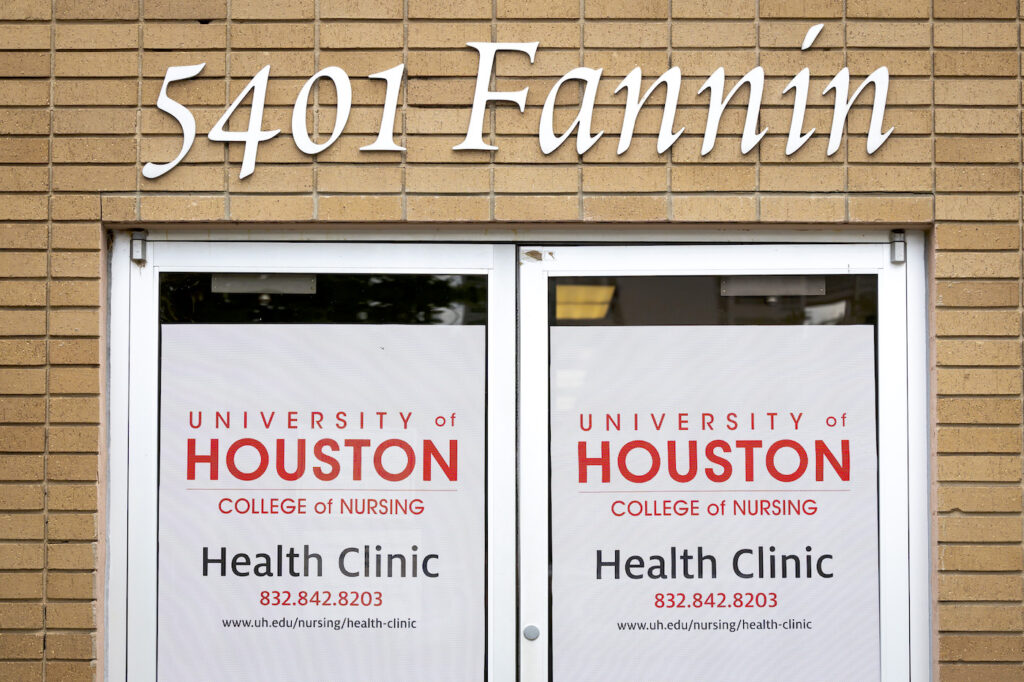
The Health Clinic was the long-time dream of Wolfe. Back in 2018, while serving as Associate Pastor of Congregational Care at St. Paul’s, he began to envision ways to care for “every stage and age in life.”
That prompted Wolfe’s attendance at the Texas Faith and Health Summit in Houston, where he learned more about the social determinants of health, including food deserts and lack of transportation to medical facilities.
At the conference, Wolfe, who now serves as Congregational Care Pastor at Chapelwood UMC in Houston, met Dr. Varghese, a nurse practitioner who heads her own pediatric clinic and professor at UH College of Nursing.
Dr. Varghese, originally from India, was looking for a way to expand telemedicine in the U.S. Wolfe was intrigued and mentioned the possibility of using the Abraham Station on St. Paul’s campus, a multi-purpose building, only partially in use.
“It was just the right size,” Wolfe said. “I was like, ‘We have a space. Let’s talk.’”
Part of the building housed the Emergency Aid Coalition (EAC), an interfaith nonprofit that provides food, clothing and assistance with basic needs to the working poor. The organization feeds about 250 individuals a day.
Varghese immediately saw potential. “People come to the EAC for food and clothing,” she said.
She envisioned adding healthcare to the mix. “We wanted to bring care to them,” Varghese said. “They’re going there anyway.”
Creating the clinic hinged on the support of the University of Houston, Varghese explained. College of Nursing Dean Kathryn Tart led the charge.
Tart had been interested in starting a nurse-managed clinic since a 2015 strategic plan. “It’s something that the staff and faculty wanted,” she recalled. “But I wondered, ‘How are we going to do it?’”
Securing funding was a hurdle, one that placed the project on hold for about two years. Then, the Humana Integrated Health System Sciences Institute stepped forward to provide funding for medical equipment. The Texas Methodist Foundation and private donors covered operating costs for the first year.
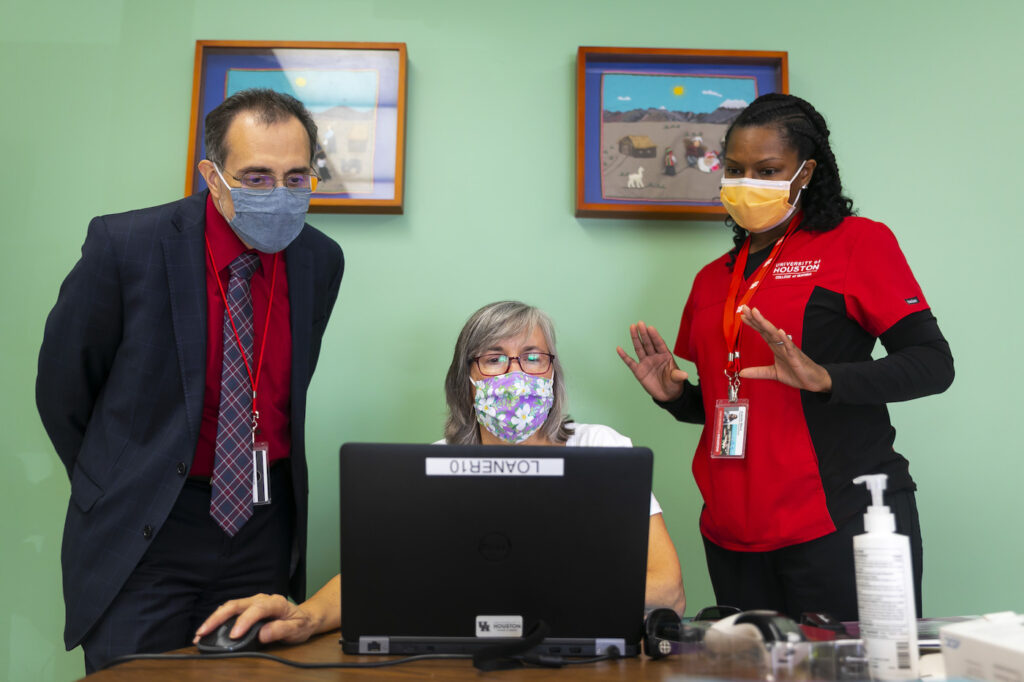
The University of Houston provided support on all levels. The College of Medicine’s associate dean Dr. David Buck joined as collaborating physician. Patricia Obulaney, certified adult nurse practitioner and UH clinical associate professor, signed on to treat patients.
Six months after the clinic opened, UH College of Nursing received a $550,000 grant from the Burt and Mae Dean Wheeler Foundation, after the organization’s managers read an article about the project in the “Houston Chronicle.”
“It was a huge answer to prayer,” Wolfe said.
The Wheeler Foundation’s donation allowed the clinic to expand to two days a week. This past December, the organization granted an additional $700,000 to the clinic, which will support operations, as well as the new Albert Schweitzer Fellows.
Dean Tart explained that two doctor of nursing students were accepted into the program, which immerses graduate students in mentored experiential learning and leadership development to more effectively address health needs of the underserved.
Schweitzer Fellows are required to design, implement, evaluate and plan for sustainable community-based prevention and intervention projects that address the social determinants of health. Following their initial year of service, the students become “Fellows for Life.”
Tart said, “The UH Health Clinic will become a ‘legacy project,’ which will be passed on to another student next year. The project will continue to live and be built upon, and then we can accept students from other disciplines and even other colleges.”
Following the healing ministry of Jesus
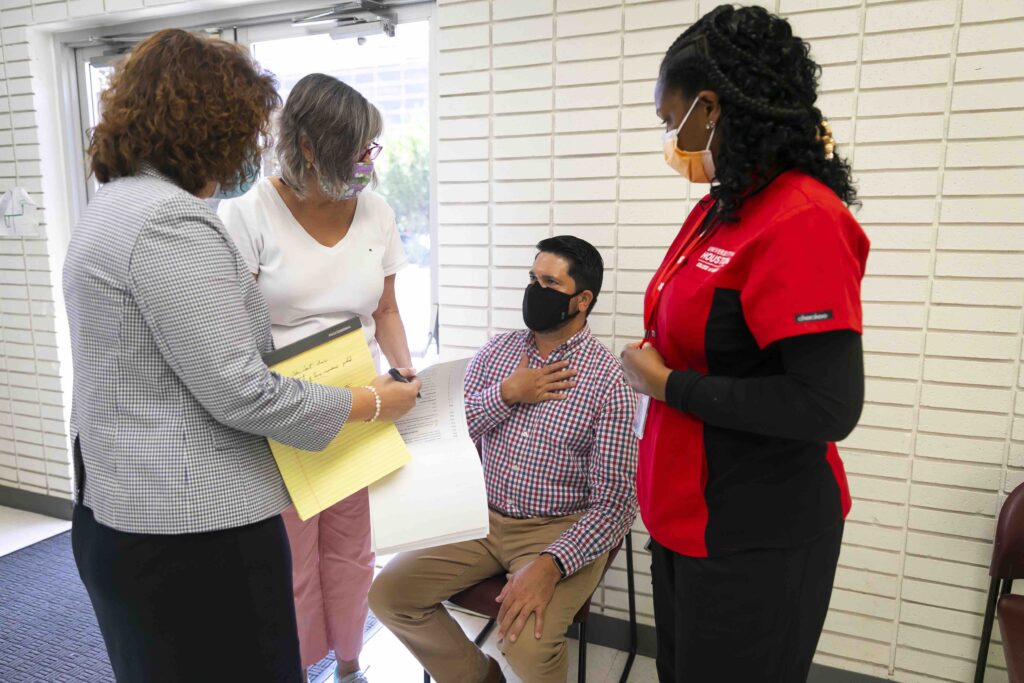
Tart explained that as a nurse-managed and operated clinic, the facility provides an unparalleled learning experience for UH students. Not only will they apply what they learned in the classroom to a clinical setting, they will also realize the possibility of their degrees.
“People need access to care, and nurse practitioners can provide it,” Tart said. “They haven’t always been given the tools or the space or perhaps the confidence to do what their license allows them. This is a great demonstration of how it can be done – and replicated.”
Varghese said that students do not normally have exposure to working with the homeless population. By creating the clinic as a teaching tool, nursing students will be equipped to provide medical care to the city in the future.
Tart said that already the clinic has validated their initial vision. “We’ve seriously helped people medically,” she said. “We have saved lives. That’s what it’s really all about.”
Varghese explained that the clinic offers top-notch care to patients who often were frustrated or leery of the healthcare system.
“The smile on their faces gives me the most satisfaction,” she said. “People feel treated with respect and dignity. They are so grateful we are here.”
As a team, Rev. Wolfe believes the church and university can help move the needle on healthcare. There is a three-year contract between St. Paul’s and UH.
Wolfe envisions that other churches could follow in St. Paul’s footsteps and provide space to health care practitioners. After all, he explained, most congregations have unused space during the week.
“It just makes sense to me that churches can do this,” he said. “I think this clinic and UH can create a template – allowing other churches to do the same thing.”
Wolfe continued, “The church needs to think about ways to care for the community – and how to address real health care disparity. It’s a way for the church to reclaim the healing ministry of Jesus, a way to reimagine what it means to love your neighbor.”
Rev. Horton said the clinic exemplifies how a church can join forces with other institutions to make a positive impact in the community. “The future of the church is going to have to be collaborative,” she said. “St. Paul’s really works to strengthen its community practices.”
Horton explained that the clinic, EAC and St. Paul’s all build each other up. She looks forward to helping the clinic gain more recognition – and continuing to expand its services. Wolfe concluded, “There’s a lot of potential here – and we’re just getting started.”
